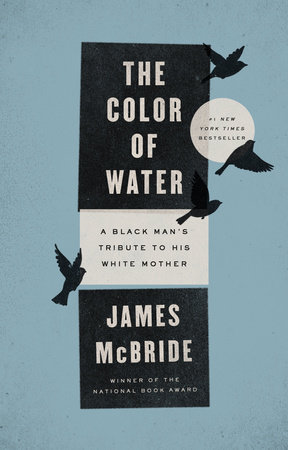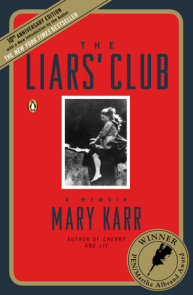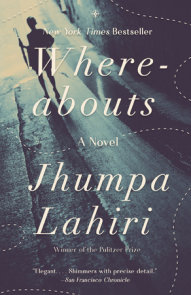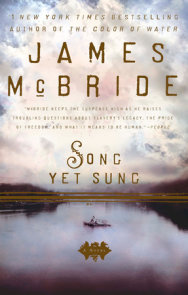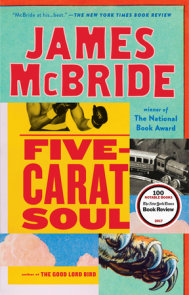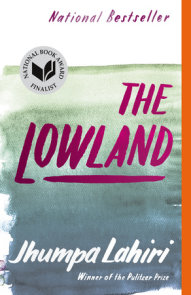READERS GUIDE
Questions and Topics for Discussion
INTRODUCTION
The Color of Water
James McBride grew up one of twelve siblings in the all-black housing projects of Red Hook, Brooklyn, the son of a black minister and a woman who would not admit she was white. The object of McBride’s constant embarrassment, and his continuous fear for her safety, his mother was an inspiring figure, who through sheer force of will saw her dozen children through college, and many through graduate school. McBride was an adult before he discovered the truth about his mother: the daughter of a failed itinerant Orthodox rabbi in rural Virginia, she had run away to Harlem, married a black man, and founded an all-black Baptist church in her living room in Red Hook. In this remarkable memoir, she tells in her own words the story of her past. Around her narrative, James McBride has written a powerful portrait of growing up, a meditation on race and identity, and a poignant, beautifully crafted hymn from a son to his mother.
ABOUT JAMES MCBRIDEJames McBride, a writer and musician, is a former staff writer for The Boston Globe, People magazine, andThe Washington Post. A professional saxophonist and composer, he has received the Richard Rodgers Development Award from the American Academy of Arts and Letters and the American Music Theater Festival’s Stephen Sondheim Award for his work in musical theater composition. He lives in South Nyack, New York.
Overwhelming acclaim for James McBride’s unforgettable memoir:
“Vibrant.”—The Boston Globe
“Incredibly moving.”—Jonathan Kozol
“James McBride evokes his childhood trek across the great racial divide with the kind of power and grace that touches and uplifts all hearts.”—Bebe Moore Campbell
“Complex and moving… suffused with issues of race, religion and identity. Yet those issues, so much a part of their lives and stories, are not central. The triumph of the book—and of their lives—is that race and religion are transcended in these interwoven histories by family love, the sheer force of a mother’s will and her unshakable insistence that only two things really mattered: school and church… The two stories, son’s and mother’s, beautifully juxtaposed, strike a graceful note at a time of racial polarization.—The New York Times Book Review
DISCUSSION QUESTIONSDiscuss Ruth McBride’s refusal to reveal her past and how that influenced her children’s sense of themselves and their place in the world. How has your knowledge—or lack thereof—about your family background shaped your own self-image?
The McBride children’s struggle with their identities led each to his or her own “revolution.” Is it also possible that that same struggle led them to define themselves through professional achievement?
Several of the McBride children became involved in the civil rights movement. Do you think that this was a result of the times in which they lived, their need to belong to a group that lent them a solid identity, or a combination of these factors?
“Our house was a combination three-ring circus and zoo, complete with ongoing action, daring feats, music, and animals.” Does Helen leave to escape her chaotic homelife or to escape the mother whose very appearance confuses her about who she is?
“It was in her sense of education, more than any other, that Mommy conveyed her Jewishness to us.” Do you agree with this statement? Is it possible that Ruth McBride Jordan’s unshakable devotion to her faith, even though she converted to Christianity from Judaism, stems from her Orthodox Jewish upbringing?
“Mommy’s contradictions crashed and slammed against one another like bumper cars at Coney Island. White folks, she felt, were implicitly evil toward blacks, yet she forced us to go to white schools to get the best education. Blacks could be trusted more, but anything involving blacks was probably substandard… She was against welfare and never applied for it despite our need, but championed those who availed themselves of it.” Do you think these contradictions served to confuse Ruth’s children further, or did they somehow contribute to the balanced view of humanity that James McBride possesses?
While reading the descriptions of the children’s hunger, did you wonder why Ruth did not seek out some kind of assistance?
Do you think it was naïve of Ruth McBride Jordan to think that her love for her family and her faith in God would overcome all potential obstacles or did you find her faith in God’s love and guidance inspiring?
How do you feel about Ruth McBride Jordan’s use of a belt to discipline her children?
While reading the book, were you curious about how Ruth McBride Jordan’s remarkable faith had translated into the adult lives of her children? Do you think that faith is something that can be passed on from one generation to the next or do you think that faith that is instilled too strongly in children eventually causes them to turn away from it?
Do you think it would be possible to achieve what Ruth McBride has achieved in today’s society?









